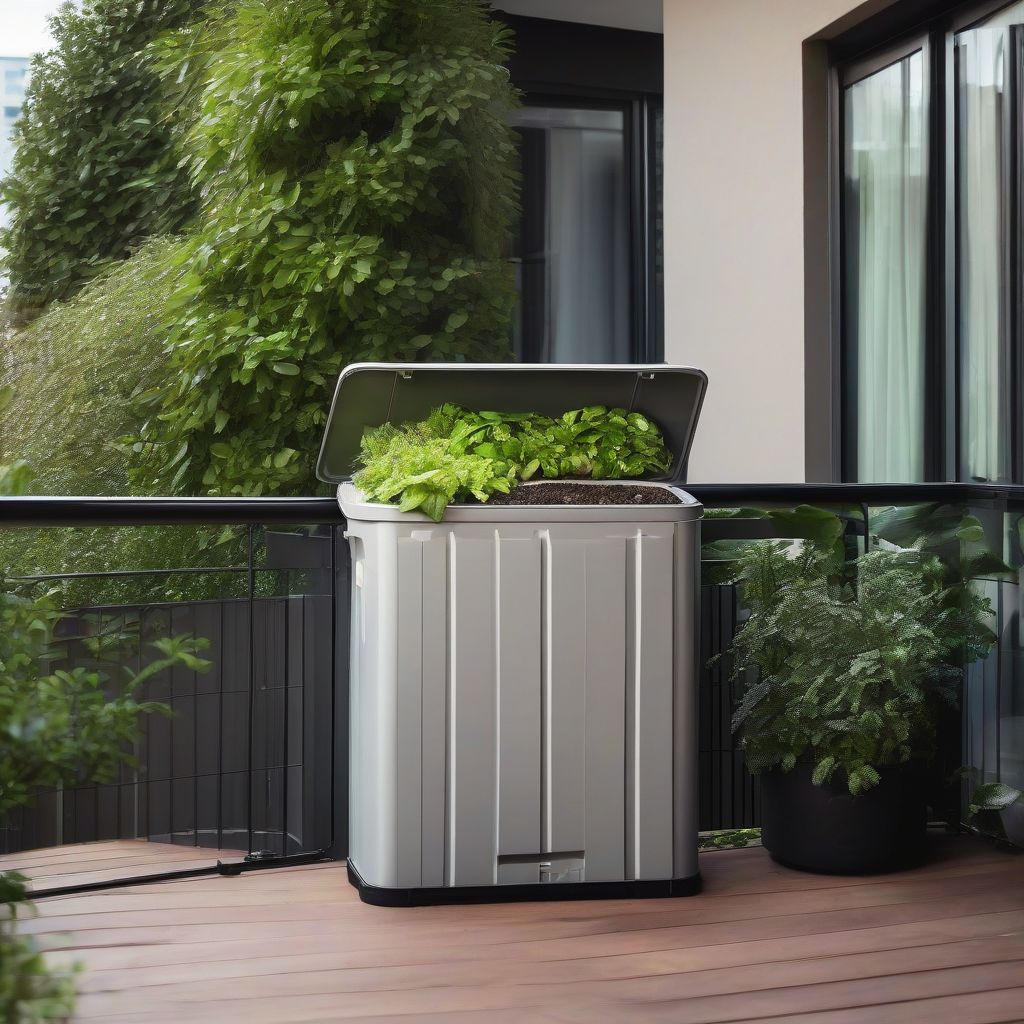Have you ever dreamt of plucking juicy tomatoes or crisp cucumbers right from your balcony garden? Imagine the satisfaction of transforming kitchen scraps into nutrient-rich “black gold” that fuels your urban oasis. Composting, my friends, is the secret ingredient to achieving both! It’s a natural process that transforms organic waste into a gardener’s best friend: compost. And trust me, as a nutritionist and meal prep coach, I know a thing or two about healthy transformations!
This isn’t just about delicious veggies, though. Composting in urban environments offers a world of benefits, from reducing our environmental impact to creating vibrant, thriving gardens. So, grab a cup of your favorite herbal tea, and let’s dig into the magic of composting in your urban garden.
Why Compost in the City? Unveiling the Benefits
You might wonder, “Is composting really practical in an urban setting?” Absolutely! In fact, city dwellers have even more reason to embrace this sustainable practice. Here’s why:
1. Transforming Waste into Garden Gold
Think about all the food scraps your urban kitchen churns out – fruit peels, coffee grounds, eggshells. Instead of heading for the landfill, these organic treasures can be composted, breaking down into a nutrient-rich soil amendment. This “black gold” is like a gourmet feast for your plants, boosting their growth and vitality.
2. Shrinking Your Environmental Footprint
Landfills are overflowing with organic waste, releasing harmful greenhouse gases like methane as they decompose. Composting diverts this waste, lessening the strain on landfills and reducing these harmful emissions. It’s a simple yet powerful way to fight climate change right from your backyard (or balcony!).
3. Cultivating Healthier, More Resilient Plants
Compost-enriched soil is teeming with beneficial microbes that improve soil structure, aeration, and drainage. This creates the perfect environment for your urban plants to thrive, making them naturally more resistant to pests and diseases. Less need for chemical fertilizers and pesticides means a healthier garden and a healthier you!
4. Connecting with Nature in the Concrete Jungle
In our busy urban lives, it’s easy to feel disconnected from the natural world. Composting brings us closer to nature’s cycles, fostering a sense of appreciation for the environment and the food it produces. Plus, the joy of witnessing your waste transform into fertile soil is incredibly rewarding!
Busting Common Composting Myths: It’s Easier Than You Think!
Many urban dwellers shy away from composting, fearing it’s complicated, messy, or smelly. Let’s debunk these myths:
Myth 1: Composting is Complicated
Not at all! You don’t need to be a gardening expert to compost. Simple composting systems are available, from compact bins for balconies to DIY setups using recycled materials. We’ll explore some easy options later on.
Myth 2: Composting is Smelly
A well-maintained compost pile actually emits an earthy, pleasant aroma. The key is to maintain the right balance of “green” materials (like food scraps) and “brown” materials (like dried leaves).
Myth 3: Composting Attracts Pests
While it’s true that compost can attract critters, proper management keeps them at bay. Securely lidded bins and the right mix of materials deter pests and keep your composting process clean and efficient.
 Urban Composting Bin
Urban Composting Bin
Urban Composting: Choosing the Right System for You
Selecting the right composting system depends on your space and lifestyle. Here are a few popular options for urban gardeners:
1. Compact Compost Bins: Balcony-Friendly and Efficient
For apartment dwellers or those with limited space, compact compost bins are ideal. These bins are designed for smaller volumes and often come with features to control odor and pests.
2. Worm Composting (Vermicomposting): Nature’s Tiny Helpers at Work
Don’t let the name deter you! Vermicomposting utilizes worms to break down food scraps, producing nutrient-rich compost tea as a bonus. It’s a great option for indoor composting, as it’s odorless when done right.
3. DIY Composting: Get Creative and Recycle
Feeling crafty? Build your own compost bin using recycled pallets, plastic totes, or even old garbage cans. DIY composting allows you to customize your system to your specific needs and space.
Getting Started: Simple Steps for Successful Urban Composting
Ready to embark on your composting journey? Here’s a step-by-step guide:
-
Choose Your System: Select the composting method that aligns with your space and preferences.
-
Gather Your Materials: You’ll need a container (your chosen bin or DIY setup), “brown” materials (dry leaves, shredded paper), “green” materials (food scraps, grass clippings), and water.
-
Layer and Mix: Start with a layer of brown materials, followed by a layer of green materials. Add water to moisten the mixture. Continue layering until your bin is nearly full.
-
Turn and Aerate: Regularly turn your compost pile with a pitchfork or aerating tool. This introduces oxygen, which is crucial for decomposition.
-
Be Patient: Composting takes time. Depending on your system and the materials used, it can take a few weeks to several months for your compost to be ready.
From Kitchen Scraps to Garden Bounty: Using Your Compost
Once your compost has transformed into a rich, dark, and crumbly material, it’s time to nourish your urban garden! Here’s how:
-
Mix with Soil: Combine compost with your potting mix or garden soil to provide essential nutrients for your plants.
-
Top Dressing: Spread a thin layer of compost on the soil surface around your plants to act as a natural fertilizer and soil improver.
-
Compost Tea: Steep finished compost in water to create a nutrient-rich “tea” that can be used as a liquid fertilizer for your plants.
The Gift that Keeps on Giving: Composting for a Greener Future
Composting in urban environments is more than just a gardening technique; it’s a powerful act of environmental stewardship. By transforming kitchen waste into a valuable resource, we contribute to a more sustainable future for ourselves and generations to come.
So, why not embark on your own composting adventure today? It’s easier than you think, incredibly rewarding, and your urban garden (and the planet!) will thank you for it.
Now, I’d love to hear from you! Share your composting experiences, questions, or tips in the comments below. Let’s create a thriving community of urban composting enthusiasts!
[amazon bestseller=”compost bin”]
